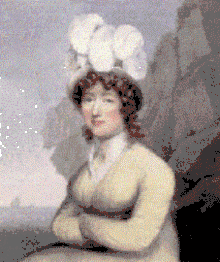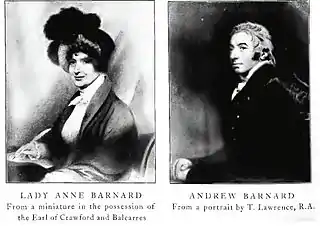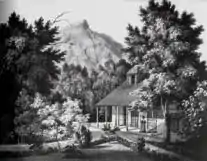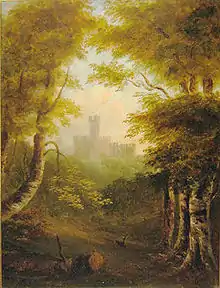Lady Anne Barnard
Lady Anne Barnard (née Lindsay; 8 December 1750 – 6 May 1825) was a Scottish travel writer, artist and socialite, and the author of the ballad Auld Robin Gray. Her five-year residence in Cape Town, South Africa, although brief, had a significant impact on the cultural and social life of the time.[1]
Lady Anne Barnard | |
|---|---|
 | |
| Born | Lady Anne Lindsay 12 December 1750 Balcarres House, Fife, Scotland |
| Died | 6 May 1825 (aged 74) London, England |
| Occupation | poet, visual artist |
Notable work | Auld Robin Gray |
| Partner(s) | Andrew Barnard |
Early life


Lady Anne Lindsay was born at Balcarres House in Fife, the ninth child and first daughter of Anne Lindsay (née Dalrymple) and James, Earl of Balcarres. In 1793 she moved to London, where she met and was married to Andrew Barnard, becoming Lady Anne Barnard. Her husband was twelve years her junior and the son of Thomas Barnard, Bishop of Limerick. She later obtained from Viscount Melville an appointment for him as colonial secretary at the Cape of Good Hope, which was then under British military occupation.
Stay at the Cape
The Barnards travelled to the Cape in March 1797, Lady Anne remaining there until January 1802.[2]
Her letters written to Melville, then secretary for war and the colonies, and her diaries of travels into the interior have become an important source of information about the people, events and social life of the time. She is also retained in popular memory as a socialite, known for entertaining at the Castle of Good Hope as the official hostess of Earl Macartney.
The remarkable series of letters, journals and drawings she produced was published in 1901 under the title South Africa a Century Ago.[3]
Later life
In 1806, on the reconquest of the Cape by the British, Andrew Barnard was reappointed colonial secretary, but Lady Anne chose to remain in London rather than accompany him to the Cape. Andrew died there in 1807, and the remainder of Anne's life was passed in London, where she died on 6 May 1825.[2]
Other works

Lady Anne was also an accomplished artist, some of her works being included in her published accounts of life in the 18th and 19th centuries. Her works include oil paintings and drawings.
The Rev. William Leeves revealed in 1812 that Auld Robin Gray had been written by her in 1772 and set to music by him. It was published anonymously in 1783, Lady Anne only acknowledging the authorship of the words two years before her death in a letter to Sir Walter Scott (1823), who subsequently edited it for the Bannatyne Club with two continuations.[2]
Legacy
Lady Anne is commemorated in several ways in Cape Town. A chamber in the Castle of Good Hope is known as "Lady Anne Barnard's Ballroom"; a road in the suburb of Newlands, where the Barnards lived, is named "Lady Anne Avenue" and a carved sculpture of her is displayed in the foyer of the civic centre in the neighbouring suburb of Claremont. The Barnards' country house, The Vineyard, survives as part of a hotel.
References
- The Claremont Clarion (June, 2010) Archived 23 July 2011 at the Wayback Machine
-
 One or more of the preceding sentences incorporates text from a publication now in the public domain: Chisholm, Hugh, ed. (1911). "Barnard, Lady Anne". Encyclopædia Britannica. 3 (11th ed.). Cambridge University Press. p. 409. This cites the memoir edited by Wilkins (see "External links").
One or more of the preceding sentences incorporates text from a publication now in the public domain: Chisholm, Hugh, ed. (1911). "Barnard, Lady Anne". Encyclopædia Britannica. 3 (11th ed.). Cambridge University Press. p. 409. This cites the memoir edited by Wilkins (see "External links"). - "South Africa a century ago; letters written from the Cape of Good Hope (1791-1801)". digital.library.upenn.edu. Retrieved 22 May 2019.
Further reading
| Library resources about Lady Anne Barnard |
| By Lady Anne Barnard |
|---|
Stephen Taylor - Defiance: The Life and Choices of Lady Anne Barnard (Faber, 2016)
External links
| Wikimedia Commons has media related to Lady Anne Barnard. |
- "Archival material relating to Lady Anne Barnard". UK National Archives.

- Sheet Music for Auld Robin Gray
- South Africa a century ago; letters written from the Cape of Good Hope (1791–1801) by Barnard, Anne Lindsay, Lady, 1750–1825, editor William Henry Wilkins. London: Smith, Elder & Co., 1910 at A Celebration of Women Writers